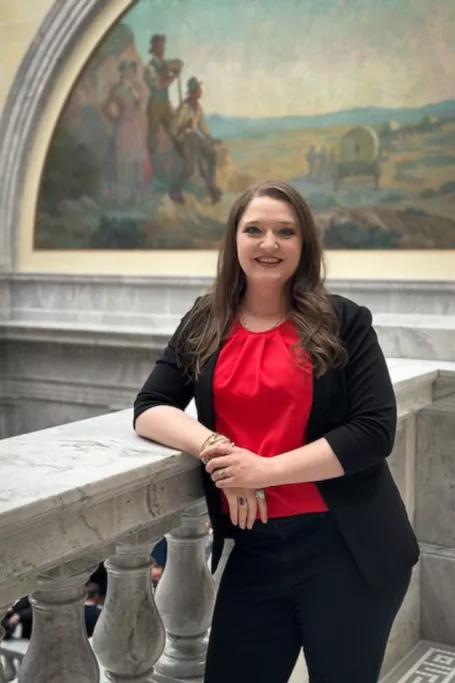Key Takeaways
- Building and maintaining relationships with legislators is crucial for educators to influence education policy effectively.
- Personal stories and firsthand experiences are powerful tools for educators to communicate the impact of legislation on schools.
- Continuous engagement in political action and advocacy is essential for creating positive changes in Utah's education system.
Education is deeply political. The choices made on Capitol Hill directly affect students and educators every day. Yet, despite the significant impact of legislative bills on education, not all educators are involved in the creation, discussion, or objection to educational legislation that will affect them. As a Policy Ambassador this year, I have learned the importance of being involved in the creation of education policy all year round.
Advocating for education on Capitol Hill just once a year on Educator Day on the Hill is simply not enough. As educators, we are the professionals in our classrooms and possess valuable insights that can help legislators make informed decisions when voting on education issues. However, year-round policy advocacy requires effort and planning. This article will discuss how to become involved in year-round education advocacy efforts.
1. Make Connections with Your Legislators
Connecting with legislators is crucial. We must establish connections with our legislators to discuss difficult topics and make headway on education needs effectively. Reaching out humanizes us to them and allows for connections that extend beyond the legislative session. Consider when a legislator last visited your school. Have they been invited? Have they seen the conditions of the schools or the concerns teachers may have firsthand? By inviting them into our schools, they can begin to understand the needs of teachers and students within their district. This firsthand experience can be more impactful than an email or a brief conversation.
2. Participate in Local-Level Political Action
While connecting with elected officials is important, sometimes the faces on Capitol Hill may need to be replaced with candidates who are more supportive of education and passionate about improving public schools and supporting educators. Involvement in local-level politics is essential to ensure the right officials are elected to represent their districts. Caucus meetings can be a great opportunity to network with locally elected officials.
3. The Power of Stories
Your stories become more powerful and memorable after trying to get to know your elected officials. Emails can be useful to ensure stories about your classroom or students are heard when meeting in person with local officials is not possible. Discussing concerns or sharing stories in person can help reinforce your message, as legislators can hear your voice's passion and desire to collaborate for positive changes. Sharing stories behind proposed bills can help legislators understand the implications of their decisions on students and teachers.
4. Discuss Education Bills with Those Around You
Engaging in friendly discussions about proposed legislation can help you understand different perspectives and prepare you to discuss your concerns with legislators. There is power in numbers, and if change is needed in education, active engagement from educators and community members is crucial. Helping community members understand the needs of schools is important, and listening to their perspectives will make you a better advocate. Conversations focused on respect and mutual inquiry can help garner support for the needs of educators and students.
5. Meet on the Hill
There is power in numbers, and showing up for Educator Day on the Hill is an effective way to demonstrate to legislators that educators are concerned and actively monitoring their actions and votes during the session. Being involved in the political process is preferable to merely being affected by it afterward. Advocating at the Hill is crucial to continue representing public education and helping legislators understand the potential impact of bills on teachers and students. Your insights can help legislators identify gaps in proposed legislation and areas for improvement. Your ongoing support, networking, and perspective can contribute to the successful passage of positive legislation.
6. Continue Building Relationships
Education policy advocacy is a year-round endeavor. Debriefing with your legislator after the legislative session can be a powerful way to reconnect, understand their thought process and voting choices, and discuss future needs. This ongoing relationship-building can also guide legislators in drafting proposed legislation that addresses specific issues in your school or district. Engagement in committee meetings can provide talking points for building relationships throughout the year.
By advocating year-round, legislators and educators can collaborate to promote a positive narrative around public education that meets the needs of students in Utah. Whether educators choose to be involved or not, legislators will continue to vote and make decisions about education. It is good professional practice to do all one can to promote positive school environments for educators and students by getting involved in the year-round process of educational advocacy.
